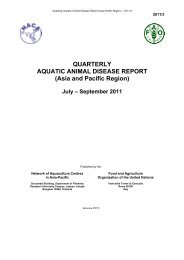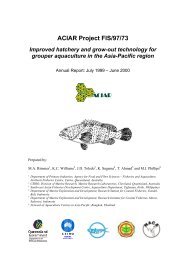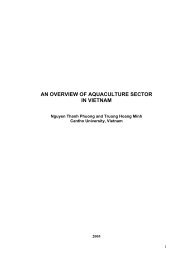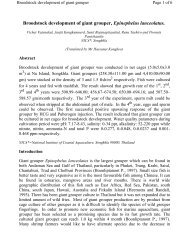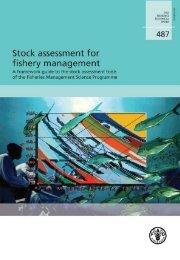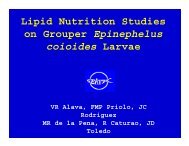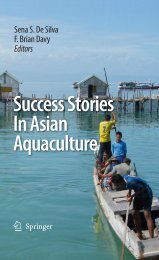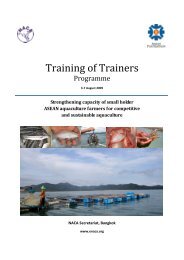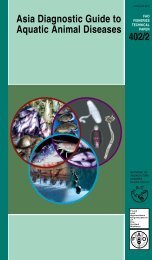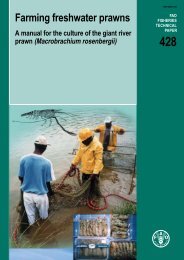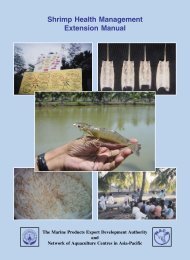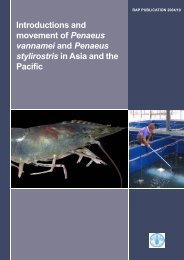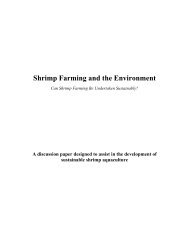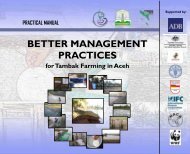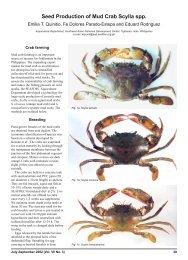State of World Fisheries and Aquaculture 2004 - Library
State of World Fisheries and Aquaculture 2004 - Library
State of World Fisheries and Aquaculture 2004 - Library
You also want an ePaper? Increase the reach of your titles
YUMPU automatically turns print PDFs into web optimized ePapers that Google loves.
64<br />
The <strong>State</strong> <strong>of</strong> <strong>World</strong> <strong>Fisheries</strong> <strong>and</strong> <strong>Aquaculture</strong> <strong>2004</strong><br />
development plans, conflicts between sustainable aquaculture development <strong>and</strong><br />
efforts to improve food security <strong>and</strong> alleviate poverty, <strong>and</strong> the high cost <strong>of</strong> compliance<br />
for small enterprises number among the possible reasons for slow progress in the<br />
development <strong>of</strong> an enabling environment for responsible aquaculture in many<br />
developing countries.<br />
Policy <strong>and</strong> governance<br />
The aquaculture sector continues to exp<strong>and</strong>, diversify, intensify <strong>and</strong> advance<br />
technologically, <strong>and</strong> still dominates all other animal-producing sectors in terms <strong>of</strong><br />
growth. The shift in the perception <strong>and</strong> objectives <strong>of</strong> aquaculture development<br />
is probably one <strong>of</strong> the important factors behind this growth. <strong>Aquaculture</strong> is now<br />
perceived not only as an activity for meeting producers’ food needs, but also as part<br />
<strong>of</strong> the engine for economic growth <strong>and</strong> achieving diverse societal <strong>and</strong> environmental<br />
goals. As the thinking shifted from aquaculture development to aquaculture for<br />
development, so did the laws <strong>and</strong> policies governing the sector.<br />
In the past, development policies focused mainly on production; in contrast, recent<br />
global aquaculture governance <strong>and</strong> policies have tended to target both the supply<br />
<strong>and</strong> dem<strong>and</strong> side <strong>of</strong> the sector, with sustainable development (economic, social,<br />
environmental, legal <strong>and</strong> institutional) as the desired outcome. On the supply side,<br />
it is now recognized that sustainable aquaculture development must be adequately<br />
regulated <strong>and</strong> protected by integrated <strong>and</strong> effective legal <strong>and</strong> administrative<br />
frameworks, <strong>and</strong> that enabling public policies <strong>and</strong> legislation granting investors, inter<br />
alia, legal rights to l<strong>and</strong> supporting the farm <strong>and</strong> to good-quality water are <strong>of</strong> the<br />
highest priority.<br />
A common feature <strong>of</strong> emerging aquaculture regulations is the obligation to acquire<br />
permits or licences to establish a farm. These give farmers the right to establish <strong>and</strong><br />
operate aquaculture facilities <strong>and</strong> at the same time allow governments to monitor the<br />
environmental sustainable development <strong>of</strong> aquaculture <strong>and</strong> to impose conditions that<br />
compel farms to be operated towards this end. Many countries, particularly developed<br />
countries, are making efforts to simplify the process <strong>of</strong> obtaining permits, particularly<br />
where several agencies are involved. While permits are <strong>of</strong>ten m<strong>and</strong>atory in developed<br />
countries, developing countries have introduced permit requirement policies only<br />
recently, probably in response to the emergence <strong>of</strong> industrial commercial farms.<br />
The FAO Code <strong>of</strong> Conduct for Responsible <strong>Fisheries</strong>, although voluntary, is having<br />
significant influence on aquaculture governance <strong>and</strong> policy. Several m<strong>and</strong>atory<br />
international instruments also have an impact on aquaculture at the national<br />
level, particularly with regard to traded aquaculture products <strong>and</strong> the movement<br />
<strong>of</strong> live organisms <strong>and</strong> germplasm. For example, the international Convention on<br />
Biological Diversity (CBD) could restrict the exchange <strong>of</strong> germplasm <strong>and</strong> movement<br />
<strong>of</strong> genetically modified organisms. 25 Additionally, part <strong>of</strong> the CBD Programme <strong>of</strong><br />
Work assesses the consequences <strong>of</strong> mariculture for marine <strong>and</strong> coastal biodiversity<br />
<strong>and</strong> promotes techniques that minimize adverse impacts. The WTO has a number <strong>of</strong><br />
binding agreements which, inter alia, define minimum quality <strong>and</strong> safety st<strong>and</strong>ards<br />
for traded aquatic organisms <strong>and</strong> establish a list <strong>of</strong> notifiable diseases (the Agreement<br />
on Sanitary <strong>and</strong> Phytosanitary Measures). 26 Matters <strong>of</strong> concern to aquaculture in the<br />
WTO Agreement on Trade-related Implications <strong>of</strong> Intellectual Property Rights include<br />
the extent to which the agreement allows for the transfer <strong>of</strong> environmentally sound<br />
technology <strong>and</strong> the patenting <strong>of</strong> living organisms. The Convention on International<br />
Trade in Endangered Species <strong>of</strong> Wild Fauna <strong>and</strong> Flora (CITES) calls for certificates <strong>of</strong><br />
25<br />
For further information, see http://www.biodiv.org/convention/articles.asp; accessed September <strong>2004</strong>.<br />
26<br />
Summaries <strong>and</strong> legal texts <strong>of</strong> the WTO Agreements are available at<br />
http://www.wto.org/english/docs_e/legal_e/legal_e.htm#agreements; accessed September <strong>2004</strong>.



